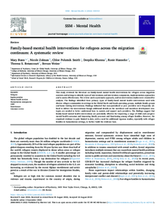This study reviewed the literature on family-based mental health interventions for refugees across migration contexts and settings to identify types of interventions and intervention components, implementation approaches and to assess effectiveness. The review used a systematic approach, and ten intervention studies were retained for analysis.
The findings identified three primary types of family-based mental health interventions used with diverse refugee communities in settings in the Global North and South-parenting groups, multiple family groups and home visiting interventions. Findings indicated that non-specialized or peer providers were frequently utilized to deliver the interventions though additional details on the workforce and workforce development strategies are needed to better understand how to sustain and support such providers.
The findings suggest that family-based mental health interventions are potentially effective for improving a range of child and caregiver mental health outcomes and improving family processes and functioning among refugee families. However, the empirical evidence is quite limited to date, with a need for additional rigorous studies, especially with refugee families in humanitarian settings, to further build the evidence base.

